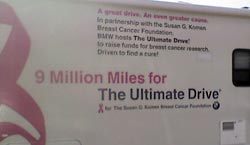Bill and Barbara Marten of Madison, Wisc., buy medications from Canada and New Zealand to save money. Bill, 68, and Barbara, 69, are skeptical a Medicare drug plan can beat what they’re paying now for their prescription drugs.
Bill Marten has marked his calendar. This Saturday, he plans to take another stab at the Medicare Prescription Drug Plan Finder.
Category: Health/Fitness
Health Savings Accounts and the Future of American Health Care
Richard L. Kaplan:
Interesting Susan G. Komen Breast Cancer Foundation Fund Raiser
 |
 |
 |
9 Million Miles for the Ultimate Drive, an interesting annual BMW test drive promotion that supports the Susan G. Komen Breast Cancer Foundation. This initiative, which raises at least $1M annually, passed through Madison today.
Costco Selling Health Insurance in California
Costco, the members-only discount retailer, is testing sales of individual health insurance policies. The pilot program launched last month in California. It targets mom-and-pop business owners, and those without a job or without job-provided health insurance.
audio
Gladwell on our Healthcare System
One of the great mysteries of political life i the United States is why Americans are s devoted to their health-care system. Six times i the past century—during the First World War during the Depression, during the Truman an Johnson Administrations, in the Senate in th nineteen-seventies, and during the Clinton years—efforts have been made to introduce som kind of universal health insurance, and eac time the efforts have been rejected. Instead, th United States has opted for a makeshift syste of increasing complexity and dysfunction Americans spend $5,267 per capita on healt care every year, almost two and half times th industrialized world’s median of $2,193; th extra spending comes to hundreds of billions o dollars a year.
Tyler Cowen offers a number of counterpoints, links really, to Gladwell’s words.
Atkins Goes Belly-Up
Atkins Nutritionals, the New York company founded in 1989 by the late Dr. Robert Atkins to cash in on his low-carb diet, filed for Chapter 11 bankruptcy protection yesterday. The company cited weakening demand for its products. Ironically, the Atkins diet–affectionately known by some as the “cheeseburger-hold-the-bun” diet–had been blamed in recent years for earnings shortfalls in companies ranging from Krispy Kreme Doughnuts (nyse: KKD – news – people ) to Kraft Foods (nyse: KFT – news – people ) to Interstate Bakeries (the maker of Wonder Bread and Twinkies).
Cheaper Health Insurance?
The idea behind the legislation, sponsored by GOP Representative John Shadegg of Arizona, is disarmingly simple: Allow Americans to buy health insurance from vendors in any one of the 50 states.
Right now Americans who aren’t lucky enough to get insurance from large employers or poor enough to qualify for Medicaid find themselves at the mercy of the legislators and insurance commissioners of the state in which they happen to live. This can be OK in states that exercise this regulatory function judiciously. But in others, the young and working poor find themselves effectively priced out of the market by special-interest regulations dressed up as consumer protections.
Bad Practices Net Hospitals More Money: The Waste in Medicare Spending
Medicare’s handling of Palm Beach Gardens is an extreme example of a pervasive problem that costs the federal insurance program billions of dollars a year while rewarding doctors, hospitals and health plans for bad medicine. In Medicare’s upside-down reimbursement system, hospitals and doctors who order unnecessary tests, provide poor care or even injure patients often receive higher payments than those who provide efficient, high-quality medicine.
Health Benefits of Working For a Lifetime
Many Americans are working well past the age of retirement. Dr. Robert Butler, founding director of the National Institute on Aging and CEO of the International Longevity Center, talks about why people choose to keep working. Butler says work gives older people’s lives meaning, control and an income.
Consumer Directed Health Care Eclipsing Managed Care?
Managed care, whatever its prospects for running Medicare better, is facing gradual eclipse in the private sector by the new strategy of consumer-directed health care, based on tax-free health savings accounts, enacted in the same 2003 Bush-promoted law that gave us giant subsidies for the managed-care business. In a new report, McKinsey likens the arrival of HSAs to the creation of 401(k)s in the 1980s, an opportunity that largely bypassed traditional banks and pension managers and was captured by mutual fund firms like Fidelity and Vanguard.